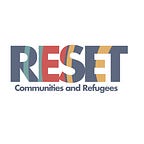Why do they do this amazing thing? What we know about the motivations of Community Sponsorship volunteers
We know that members of Community Sponsorship Groups are incredibly committed and give significant time as well as expertise, baked good, funds and a whole range of other assets towards transforming the lives of refugees. (Though they don’t tend to see it like that, instead typically starting sentences with ‘We just…’!)
But we’re also aware that we don’t know as much as we’d like to about the incredible volunteers we work to support. And that understanding is important if we’re to work effectively to engage more volunteers in Community Sponsorship.
Last week, we launched Communities for Refugees: a campaign to demonstrate support for resettlement and get volunteers ready to welcome refugees when resettlement resumes. We’re hugely excited about the campaign and the networks and partners we’re working with to spread the word.
As we developed the campaign, we drew on a range of emerging insights that have helped us reflect on what motivates Community Sponsorship volunteers, why they get involved, and why they stay involved.
1. The importance of personal connections for reaching new volunteers
In the UK, research from the Institute for Research into Superdiversity at the University of Birmingham reveals that volunteers are drawn into Community Sponsorship through organisations they’re already involved in and through friends and family. Last autumn we ran a project to test the idea that Community Sponsorship can grow effectively through personal connections.
We worked with Good Faith Partnership (GFP) to identify and support ‘influencers’ (well-networked individuals with a passion for Community Sponsorship) who could draw personal and professional contacts to a ‘Community Sponsorship Summit’ event. Together with GFP we explored and tried out a range of options and ran summits in London and Newcastle led by Community Sponsorship Group members and supporters.
CHARIS Refugees, who run the South West Network for Community Sponsorship Groups, also tested the same idea by holding events for Groups to bring their friends, family, neighbours and colleagues to learn about the scheme. 6 new groups began their journey to Community Sponsorship through these events!
These experiences confirmed for us that:
· Personal experience of Community Sponsorship is a key driver for recommending the scheme
· Even for ‘warm’ contacts in an influencer’s network, it takes time from when they first hear about Sponsorship to being ready to commit
· Working on a local or regional basis has had real success (CHARIS has shared how they put together local networking events)
2. Understanding volunteer motivations
This summer we commissioned a small piece of volunteer motivation research. This research saw 15 people take part in semi-structured interviews on their volunteer journey and motivations. 10 of those who took part were involved in Community Sponsorship and five were involved in other projects to support refugees and asylum seekers. Four of the participants were in professional, paid roles in refugee resettlement (often working with volunteers) and the other eleven were volunteers themselves.
Whilst recognising the limitations of a small set of data, we learnt so much: for the messaging of Communities for Refugees, for the training and support which Reset provides, and for ways to develop community-led welcome in the future. Some of what we learned included:
· Our interviewees are do-ers, they want to do good, and Community Sponsorship is hands-on.
· Choice is important, volunteers are not ordered to get involved, they choose to, and they do it for a range of reasons: a calling to support refugees prompted by media coverage and/or rooted in faith; a practical response to political discourses they were uncomfortable with; a change in their lives that gave them more time.
· Volunteers’ hands-on involvement increased sympathy and insight into the plight of refugees and a distaste for the treatment of people seeking asylum, especially when compared to the resettlement process (in which there was a sense of confidence and pride) and the Community Sponsorship scheme where interviewees saw so much opportunity to give time and kindness.
· We didn’t ask directly about barriers to ongoing motivation, but a theme that came through was much time spent agonising by Groups on how best to promote independence of refugees over reliance on the Group.
· Interviewees were universally interested in other ways in which community-led support could be adapted for other newcomers in their community, such as refugees arriving with work visas, asylum seekers and unaccompanied young people. They saw challenges in such potential schemes, but were not put off the opportunity to help other newcomers move their lives forward.
3. Understanding what volunteers learn and gain from Community Sponsorship
Over the past few months we’ve been working to collate data on the experience of Community Sponsorship volunteers to understand what they value about their journey and the factors that continue to motivate them. We’ve been emailing Group members with a short survey at the end of their one-year sponsorship agreement. Overwhelmingly, Community Sponsorship brings a sense of satisfaction and of community to volunteers. And they are learning about, for example, the difficulties that people face navigating life in the UK with limited English and accessing statutory services.
We’re incredibly fortunate to have contact with all Community Sponsorship Groups through our work, which puts us in a good position to learn from their experiences. Once resettlement restarts and we’re running our Part 2 training, we’ll be asking all Group members to answer 10 questions about what they learn when applying to sponsor a refugee family with the aim of growing our data set and our understanding.
We’re really interested to keep learning about what motivates Community Sponsorship volunteers. If you have thoughts and insights, from research or your own experience, do get in touch!
Kate Brown and Carly Whyborn
